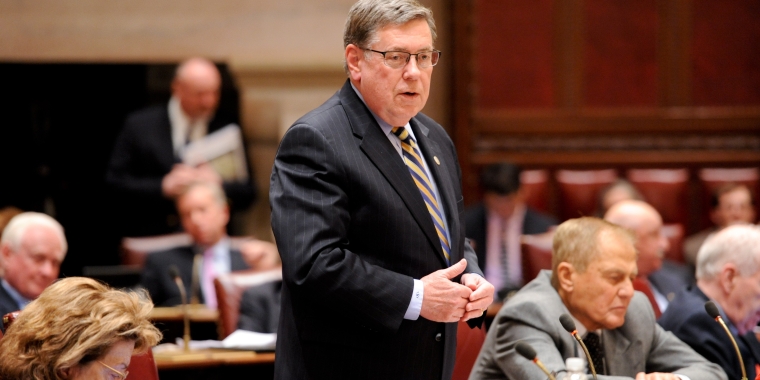
Cut Government Mandates - Save Local Tax Dollars
James L. Seward
November 13, 2009

As local governments seek creative ways to save money they often look to the state for assistance. One of the most important avenues I have long pursued is mandate relief. During the recent special legislative session in Albany we were able to take a step in the right direction by passing a bill aimed at encouraging efficiencies that would ultimately benefit local property taxpayers.
Let me first say that this bill is only a start. There are additional measures that must be taken at the state level to assist our partners in local government, and I will continue to fight for them. In the meantime, this bill does provide some solid stepping stones.
The bill is broken down into six segments.
Part A: Municipal Cooperative Health Benefit Plan Flexibility. One of the most costly components of any local government budget is health insurance. This new bill will make it easier for municipalities to form cooperative health benefit plans for their employees. The current regulations are far too stringent. In fact, not a single municipal cooperative health benefit plan has been formed since the enactment of the current regulations in 1994. By relaxing the requirements and opening the door for cooperative health benefit plans, overall health insurance costs should go down for our municipalities.
Part B: Shared Highway Services. The bill creates flexibility that will allow shared services agreements among municipalities and between municipalities and state agencies. Overall, this will make the delivery of highway services more efficient and cost effective at both the state and local levels.
Part C: Shared Public Health Directors. Counties will now be able to share one public health director. The change will enable smaller counties to reduce administrative costs without lowering the quality of services provided to the public.
Part D: Increased Local Procurement Thresholds. Currently, all contracts for public work involving an expenditure of $20,000 must be publicly bid. By increasing the threshold to $35,000 the red tape and associated expense will be eliminated for smaller projects.
Part E: Municipal Bond Bank Agency (MBBA) Bonding Authorization. This year the federal government passed the American Recovery and Reinvestment Act which provides new categories of taxable bonds known as “Build America Bonds” and “Recovery Zone Economic Development Bonds” that could be issued in lieu of tax exempt bonds and that allow issuers to receive a direct federal subsidy or offer bondholders a federal tax credit. These new bonds will only be available through 2010 and are geared toward public infrastructure improvements. The change in the law will allow municipalities to tap into this funding source, lowering borrowing costs and providing savings to taxpayers.
Part F: Collateral Source and Subrogation Parity. This provision of the bill relates to public employees hurt on the job. The new law will help reduce legal costs and also expedite the settlement of various legal actions. One mayor wrote in support of this change, “This legislation would save municipalities millions of dollars annually by giving the same benefit to public employers that private defendants now enjoy, a matter of fundamental fairness and sound public policy.” In fact, a coalition of 1,435 public employers, organizations and officials specifically offered support for this measure.
By providing our local governments with increased operational flexibility, elected leaders will be able to share services, become more efficient and in the long run, save taxpayers money. New Yorkers have the highest local taxes in the nation- 78 percent above the national average- and a portion of this can be attributed to unfunded mandates passed down from the federal and state levels.
Taking steps to reduce the local property tax burden will assist our municipalities and cash strapped families while at the same time making the state more attractive to business interests. The result will be increased economic development opportunities throughout New York along with a healthier bottom line.
Share this Article or Press Release
Newsroom
Go to NewsroomFamilies Have Suffered Enough
May 24, 2017



